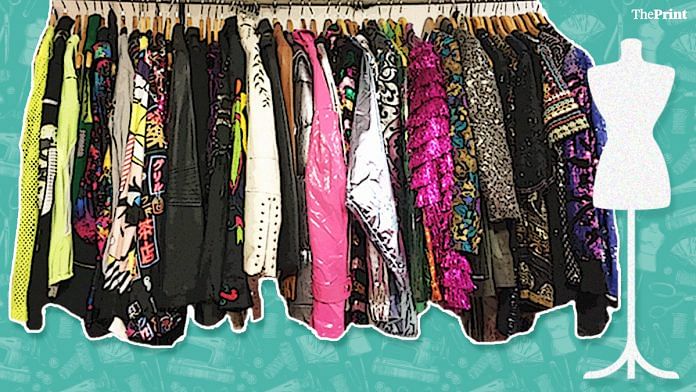The government’s Unlock 1 order gave malls and markets the go-ahead to reopen with caveats. But clothing store owners are struggling to get back on track. Many were already on a rocky road even before Covid, thanks to the double whammy of demonetisation and GST, and now, broken supply chains and a crash in consumer spending means that many don’t see the possibility of a pickup in revenues until September, if at all.
With clothing seen as a non-essential item, and obvious fears about trying on clothes in a shop that someone else would have tried on before, buyers are scarce — and store owners are trimming staff accordingly. “Shopping is not going to be a priority for people for a while. Offices are open, but people are still working from home. Schools and colleges are still shut, too. People are not really socialising, so why shop for clothes if you can’t flaunt them?”, explains Tushar Pamnani, owner of the soon-to-be-closed Nandini Collection in Delhi’s Amar Colony.
Then there is the shortage of labour. Store owners in the capital’s well-known Sarojini Nagar Market aren’t just dealing with a drop in customers, but labour, too, with 50-60 per cent of Delhi’s apparel shop staff having returned to their homes in Uttar Pradesh, Bihar and Jharkhand.
The question now seems to be less about shoppers’ readiness to come out and more about a shop’s readiness to open.
Also read: India is being forced to unlock during pandemic. But it’s no green zone yet
Between a rock and rent
In May, the apparel sector witnessed an 84 per cent drop in sales. Low demand coupled with rent and overhead store charges is driving businesses like Pamnani’s into the ground. Unable to afford the rent, which was approximately Rs 70,000, Pamnani is closing Nandini Collection after three years and says countless other stores in Amar Colony are closing down as well. He is now selling all his inventory in bulk to “lot boys” who, he tells ThePrint, sell goods on the outskirts of Delhi in rural areas. “It’s a jugaad way of getting rid of stock,” he says.
Compared to high-scale retailers demanding 100 per cent rental waivers from mall owners, many stores in places like Amar Colony or Sarojini Nagar Market have landlords who can’t budge on rent as it’s the only source of livelihood for their families.
Caught in a tough spot, clothing stores that have opened are now in survival mode, cutting operational costs and sacking employees. Apparel brands have stopped ordering fresh stock, and put orders of fall-winter collections on hold as they try to get rid of excess items from previous collections.
Jatin Malhotra, who owns three ethnic wear shops in Lajpat Nagar (one on rent and two are his own) says he’s now “working with 50 per cent capacity and [therefore] 50 per cent staff”. Since he opened his store on 1 June, he has been getting an average of 10-15 walk-in shoppers a day. However, since most of the store’s revenue comes from selling running fabric in bulk to boutique shops, the supply chain seems to be broken with little to no demand from boutique shops.
But he’s not quite as despondent, even after a 60-70 per cent drop in sales since lockdown. He is looking ahead to September and the Diwali season, when sales usually double. “It’s not as though sales were great before Covid,” he says. “The market was still recovering from note bandi [demonetisation] and GST.”
Also read: Open kitchens, hygiene perception & plexiglass: How restaurants might remodel post-Covid
Flash sales for emergency cash
Having been forced to dip into their personal savings to keep their stores running during lockdown, some store owners are now trying to sell as much inventory as possible for liquidity. Pranav Sood, co-owner of a Mumbai-based clothing rental store, tells ThePrint that his business relies heavily on the film industry rather than walk-ins, and since there have been no movie shoots for months now, he is feeling the impact.
With 10-15 film projects on hold, his plan is to now sell goods online, including via Instagram. “If we put 10 items up for sale, usually two are sold. I wasn’t surprised by this since our business is very much based on touch. Customers like to come in and touch and feel the garments before renting them for a shoot,” says Sood. Malhotra, too, expressed concern about selling online since “it’s hard to showcase intricate embroidery on a website”.
Brands, too, are looking at ways to adapt to the Covid era, and one of those ways is through Covid fashion. Well known brand The Label Life has started online sales of a work-from-home collection and are heavily promoting nightwear. Meanwhile, face masks have become fashion statements.
Smaller production teams and reducing to match demand is another way out. To that end, something like Delhi-based leather bag brand Chiaroscuro, which is completely online and works on a made-to-order basis, is at an advantage, since it maintains a light stock and has a team of only about 20 people.
Founder Smriti Sain tells ThePrint that Chiaroscuro went from making approximately 10 per cent of regular sales in April to 35 per cent in May and hopes to reach normal revenues by the end of June. She says that this way of working is “a lot more sustainable in the way you handle your raw material, use the productivity of your artisans and also your finished goods.”
Also read: From remote shoots to topical plots, how advertising races to stay relevant in the pandemic



